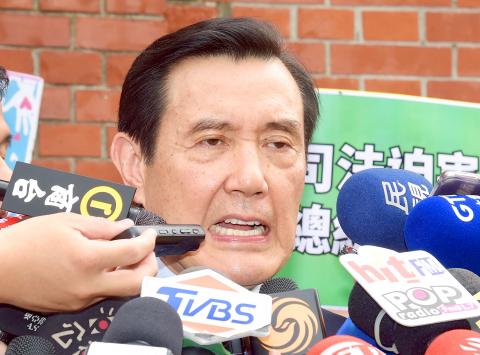Former president Ma Ying-jeou (馬英九) yesterday vowed to appeal a decision by the Taiwan High Court to convict him of leaking classified information, saying that he aims to not only defend his rights, but also to seek clarification on the boundaries of the presidential mandate.
“As [yesterday’s] ruling reached a different conclusion than the three previous verdicts, we need to clarify this issue,” Ma said in response to reporters’ questions on the sidelines of a public event in Taipei.
The case is essentially litigating constitutional matters, Ma said, adding that he has to fight not only for his own rights, but also to ensure that the mandate of the nation’s presidents will not be restricted.

Photo: Huang Yao-cheng, Taipei Times
“I will definitely appeal the ruling,” Ma said while surrounded by scores of supporters, some of whom waved Republic of China flags and held cardboard posters that read: “Oppose political persecution.”
Asked whether the guilty verdict was associated with Control Yuan member Chen Shih-meng’s (陳師孟) pledge in January to focus on Ma and judges who appear lenient toward the pan-blue camp, Ma said that the public would have its own judgement on the matter.
He also struck back at the court’s ruling, which sentenced him to four months in prison for leaking information regarding an ongoing investigation and said that he failed to set a good example for society as the democratically elected head of state.
“Failing to set a good example would be if I chose to go home and take a nap while facing this case,” Ma said.
Yesterday’s ruling was the second verdict in a case filed by the Taipei District Prosecutors’ Office and can still be appealed. Ma was acquitted in the first ruling in August last year.
The case was derived from an incident in September 2013, when Ma gave then-premier Jiang Yi-huah (江宜樺) and then-Presidential Office deputy secretary-general Lo Chih-chiang (羅智強) wiretapped conversations gathered as part of an ongoing investigation into alleged lobbying by Democratic Progressive Party caucus whip Ker Chien-ming (柯建銘).
Ma claimed his actions were an attempt to assuage the scandal’s potential effects on the relationship between the Executive Yuan and the Legislative Yuan, as it also implicated then-legislative speaker Wang Jin-pyng (王金平) and then-minister of justice Tseng Yung-fu (曾勇夫), prosecutors said.
In his defense, Ma cited Article 44 of the Constitution, which affords the president the right to provide consultations on a dispute involving two or more branches of the government.
Ma was last year acquitted in two rulings on a case filed by Ker, one in March and the other in October.
Yesterday’s ruling “has raised concerns about whether Chen’s remarks have caused a chilling effect in the judicial community,” Ma’s office spokeswoman Hsu Chiao-hsin (徐巧芯) said, adding that Ma did what any responsible president would have done to prevent a potential constitutional crisis.
Expressing the Chinese Nationalist Party’s (KMT) regret over the verdict, Culture and Communications Committee director-general Lee Ming-hsien (李明賢) said in a statement that the ruling has misinterpreted the law and humiliated a former president.

Chinese Nationalist Party (KMT) Chairman Eric Chu (朱立倫), spokeswoman Yang Chih-yu (楊智伃) and Legislator Hsieh Lung-chieh (謝龍介) would be summoned by police for questioning for leading an illegal assembly on Thursday evening last week, Minister of the Interior Liu Shyh-fang (劉世芳) said today. The three KMT officials led an assembly outside the Taipei City Prosecutors’ Office, a restricted area where public assembly is not allowed, protesting the questioning of several KMT staff and searches of KMT headquarters and offices in a recall petition forgery case. Chu, Yang and Hsieh are all suspected of contravening the Assembly and Parade Act (集會遊行法) by holding

PRAISE: Japanese visitor Takashi Kubota said the Taiwanese temple architecture images showcased in the AI Art Gallery were the most impressive displays he saw Taiwan does not have an official pavilion at the World Expo in Osaka, Japan, because of its diplomatic predicament, but the government-backed Tech World pavilion is drawing interest with its unique recreations of works by Taiwanese artists. The pavilion features an artificial intelligence (AI)-based art gallery showcasing works of famous Taiwanese artists from the Japanese colonial period using innovative technologies. Among its main simulated displays are Eastern gouache paintings by Chen Chin (陳進), Lin Yu-shan (林玉山) and Kuo Hsueh-hu (郭雪湖), who were the three young Taiwanese painters selected for the East Asian Painting exhibition in 1927. Gouache is a water-based

Taiwan would welcome the return of Honduras as a diplomatic ally if its next president decides to make such a move, Minister of Foreign Affairs Lin Chia-lung (林佳龍) said yesterday. “Of course, we would welcome Honduras if they want to restore diplomatic ties with Taiwan after their elections,” Lin said at a meeting of the legislature’s Foreign Affairs and National Defense Committee, when asked to comment on statements made by two of the three Honduran presidential candidates during the presidential campaign in the Central American country. Taiwan is paying close attention to the region as a whole in the wake of a

OFF-TARGET: More than 30,000 participants were expected to take part in the Games next month, but only 6,550 foreign and 19,400 Taiwanese athletes have registered Taipei city councilors yesterday blasted the organizers of next month’s World Masters Games over sudden timetable and venue changes, which they said have caused thousands of participants to back out of the international sporting event, among other organizational issues. They also cited visa delays and political interference by China as reasons many foreign athletes are requesting refunds for the event, to be held from May 17 to 30. Jointly organized by the Taipei and New Taipei City governments, the games have been rocked by numerous controversies since preparations began in 2020. Taipei City Councilor Lin Yen-feng (林延鳳) said yesterday that new measures by